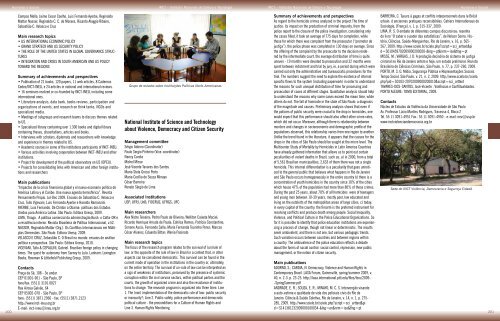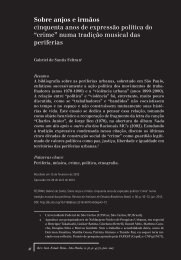livro
livro
livro
Create successful ePaper yourself
Turn your PDF publications into a flip-book with our unique Google optimized e-Paper software.
Humanas e Sociais INCT – Institutos Nacionais de Ciência e Tecnologia<br />
INCT – Institutos Nacionais de Ciência e Tecnologia<br />
Humanas e Sociais<br />
Campos Mello, Jaime Cesar Coelho, Luis Fernando Ayerbe, Reginaldo<br />
Mattar Nasser, Reginaldo C. C. de Moraes, Ricardo Alaggio Ribeiro,<br />
Sebastião C. Velasco e Cruz<br />
Main research topics<br />
• US INTERNATIONAL ECONOMIC POLICY<br />
• GRAND STRATEGY AND US SECURITY POLICY<br />
• THE ROLE OF THE UNITED STATES IN GLOBAL GOVERNANCE STRUC-<br />
TURES<br />
• INTEGRATION AND CRISIS IN SOUTH AMERICAN AND US POLICY<br />
TOWARD THE REGIONS<br />
Summary of achievements and perspectives<br />
• Publication of 21 books, 120 papers, 11 web articles, 8 Cadernos<br />
Cedec/INCT-INEU, e 24 articles in national and international reviews.<br />
• 16 seminars realized or co-founded by INCT-INEU, including some<br />
international ones.<br />
• Literature analysis, data bank, books reviews, participation and<br />
organizations of events, and research on think tanks, NGOs and<br />
specialized media.<br />
• Meetings of subgroups and research teams to discuss themes related<br />
to US.<br />
• Specialized library containing over 1.300 books and digital library<br />
containing theses, dissertations, articles and books.<br />
• Interviews with scholars, diplomats and researchers with knowledge<br />
and experience in themes related to US.<br />
• Academic courses in some of the institutions participants of INCT-INEU.<br />
• Various activities involving cooperation between INCT-INEU and other<br />
institutions.<br />
• Project for development of the political observatory on US (OPEU).<br />
• Projects for consolidating links with American and other foreign institutions<br />
and researchers<br />
Grupo de estudos sobre Instituições Políticas Norte-Americanas<br />
National Institute of Science and Technology<br />
about Violence, Democracy and Citizen Security<br />
Management committee<br />
Sérgio Adorno (Coordinator)<br />
Paulo Sergio Pinheiro (Vice-coordinator)<br />
Nancy Cardia<br />
Michel Misse<br />
José Vicente Tavares dos Santos<br />
Maria Stela Grossi Porto<br />
Maria Cecília de Souza Minayo<br />
César Barreira<br />
Renato Sérgio de Lima<br />
Summary of achievements and perspectives<br />
As regard to the homicide crimes analyzed in the project The time of<br />
justice: its impact on the production of criminal impunity, from the<br />
police report to the closure of the police investigation, considering only<br />
the cases filled, it took an average of 775 days for completion, while<br />
those for which there was complaint from the prosecutor (“promotor de<br />
justiça”), the police phase was completed in 130 days on average. Since<br />
the offering of the complaint by the prosecutor to the decision rendered<br />
by the intermediate court, the average distribution of time is quite<br />
uneven - 19 months were devoted to prosecution and 32 months were<br />
spent between indictment and trial by jury, ie, a period during which were<br />
carried out only the administrative and bureaucratic procedures for the<br />
trial. The numbers suggest the need to explore the existence of internal<br />
specific flows to the system (including paperwork) in order to understand<br />
the reasons for such unequal distribution of time for processing and<br />
prosecution of cases at different stages. Qualitative analysis should help<br />
to understand the reasons why some cases exceed the mean time, while<br />
others do not. The fall of homicide in the state of São Paulo: a diagnosis<br />
of the magnitude and causes. Preliminary analysis shows that even if<br />
the policies of public security were crucial to the drop in homicides, one<br />
would expect that this performance should also affect other crime rates,<br />
which did not occur. Moreover, although there is relationship between<br />
murders and changes in socioeconomic and demographic profile of the<br />
populations observed, this relationship varies from one region to another.<br />
Unlike the trend found in the literature, it appears that the causes for the<br />
drops in the cities of São Paulo should be sought at the micro level. The<br />
Multicenter Study of Mortality by Homicides in Latin America Countries<br />
have already gathered information that allows us to point out certain<br />
peculiarities of violent deaths in Brazil, such as: a) in 2000, from a total<br />
of 5,561 Brazilian municipalities, 2,633 of them there was not a single<br />
homicide. This internal differentiation is a peculiarity that goes unnoticed<br />
to the general public that believes what happens in Rio de Janeiro<br />
and São Paulo occurs homogeneously in the entire country b) there is a<br />
concentration of youth homicides in the country since 10% of the cities<br />
which house 47% of the population had more than 80% of these crimes.<br />
During the past 25 years, about 70% of all homicides were of teenagers<br />
and young men between 10-39 years, mostly poor, low educated and<br />
living on the outskirts of the metropolitan areas of large cities, c) today,<br />
in every capital of the country, the firearm is the preferred instrument for<br />
resolving conflicts and produce death among people. Social Inequality,<br />
Violence, and Political Culture in the Police Educational Organizations. So<br />
far it is possible to identify that police education institutions are experiencing<br />
a process of change, though not linear or deterministic. The results<br />
seem ambivalent, and there is not one, but various pedagogic trends.<br />
Such variation occurs between countries and between regions within<br />
a country. The ambivalence of the police education reflects a debate<br />
about the forms of social control: social control, repression, new public<br />
management, or the notion of citizen security.<br />
BARREIRA, C. Tueurs à gages et conflits interpersonnels dans le Brésil<br />
urbain: d anciennes pratiques reconsidérées. Cahiers Internationaux de<br />
Sociologie, [França], v. 1, p. 315-337, 2009.<br />
LIMA, R. S. O embate de diferentes campos discursivos: resenha<br />
do <strong>livro</strong> “O saber e o poder das estatísticas”, de Nelson Senra. História,<br />
Ciências, Saúde-Manguinhos, Rio de Janeiro, v. 16, p. 565-<br />
567, 2009: http://www.scielo.br/scielo.php?script=sci_arttext&pi<br />
d=S010459702009000200020-&lng=pt&nrm=iso&tlng=pt<br />
MISSE, M.; VARGAS, J. D. A produção decisória do sistema de justiça<br />
criminal no Rio de Janeiro ontem e hoje: um estudo preliminar. Revista<br />
Brasileira de Ciências Criminais, São Paulo, n. 77, p. 237-260, 2009.<br />
PORTO, M. S. G. Mídia, Segurança Pública e Representações Sociais.<br />
Tempo Social, São Paulo, v. 21, n. 2, 2009. http://www.scielo.br/scielo.<br />
php?pid=S0103-20702009000200010&script=sci_arttext<br />
TAVARES-DOS-SANTOS, José-Vicente . Violências e Conflitualidades.<br />
PORTO ALEGRE: TOMO EDITORIAL, 2009.<br />
Contacts<br />
Núcleo de Estudos da Violência da Universidade de São Paulo<br />
Av. Professor Lúcio Martins Rodrigues, Travessa 4, Bloco 2<br />
Tel. 55 11 3091-4951 Fax.: 55 11 3091-4950 - e-mail: nev@usp.br<br />
www.inctviolenciaedemocracia.org.br<br />
Main publications<br />
“Impactos de la crisis financiera global y el nuevo escenario politica de<br />
América Latina y el Caribe: Una nueva agenda hemisférica”. Revista<br />
Sede do INCT Violência, Democracia e Segurnça Cidadã<br />
Pensamiento Propio. Jul-Dec 2009. Ensaios de Sebastião C. Velasco e Associated Institutions<br />
Cruz, Tullo Vigevani, Luis Fernando Ayerbe e Haroldo Ramanzini.<br />
AYERBE, Luis Fernando. De Clinton a Obama: políticas dos Estados<br />
USP; UFRJ; UnB; FIOCRUZ; UFRGS; UFC<br />
Unidos para América Latina. São Paulo: Editora Unesp, 2009.<br />
Main researchers<br />
LIMA, Thiago. A política comercial da administração Bush: o Cafta-DR e Alex Niche Teixeira; Pedro Paulo de Oliveira; Welliton Caixeta Maciel;<br />
a resistência interior. Revista Brasileira de Política Internacional, v.52. Ricardo Henrique Arruda de Paula; Ednilsa Ramos; Patrícia Constantino;<br />
NASSER, Reginaldo Mattar (Org.). Os Conflitos Internacionais em Múlti- Simone Assis; Fernando Salla; Maria Fernanda Tourinho Perez; Marcos<br />
plas Dimensões. São Paulo: Editora Unesp, 2009.<br />
VELASCO E CRUZ, Sebastião C. O Brasil no mundo: ensaios de análise<br />
César Alvarez; Eduardo Bittar; Wania Pasinato<br />
política e prospectiva. São Paulo: Editora Unesp, 2010.<br />
Main research topics<br />
VIGEVANI, Tullo & CEPALUNI, Gabriel. Brazilian foreign policy in changing The focus of the research program relates to the survival of (un)rule of<br />
times. The quest for autonomy from Sarney to Lula. Lanham: Lexington law, or the opposite of the rule of law in Brazil in a context that, in other<br />
Books, Rowman & Littlefield Publishing Group, 2009.<br />
aspects can be considered democratic. This survival can be found in the<br />
current mode of operation in the institutions in the country or, ultimately,<br />
Main publications<br />
Contacts<br />
on the entire territory. The survival of un-rule of law can be interpreted as<br />
ADORNO, S.; CARDIA, N. Democracy, Violence and Human Rights in<br />
Praça da Sé, 108 - 3o andar<br />
a sign of weakness of institutions, perceived by the presence of systemic<br />
Contemporary Brazil. LASA Forum, Gainesville, spring/summer 2009, v.<br />
CEP 01001-901 - São Paulo, SP<br />
corruption within the civil service sectors, within political parties and the<br />
40, n. 2-3. p. 23-25. http://lasa.international.pitt.edu/files/foru/2009fone/fax:<br />
(5511) 3101.0027<br />
courts, the growth of organized crime and also the resistance of institu-<br />
-SpringSummer.pdf<br />
Rua Airosa Galvão, 64<br />
tions to change. The research program is organized into three lines: Line<br />
ANDRADE, E. R.; SOUZA, E. R.; MINAYO, M. C. S. Intervenção visando<br />
CEP 05002-070 - São Paulo, SP<br />
1. The (non) implementation of the democratic rule of law: public security<br />
a auto-estima e qualidade de vida dos policiais civis do Rio de<br />
fone: (5511) 3871.2966 - fax: (5511) 3871.2123<br />
or insecurity?; Line 2. Public safety, police performance and democratic<br />
Janeiro. Ciência & Saúde Coletiva, Rio de Janeiro, v. 14, n. 1, p. 275http://www.inct-ineu.org.br<br />
political culture - the preconditions for a Culture of Human Rights and<br />
285, 2009. http://www.scielo.br/scielo.php?script=sci_arttext&pi<br />
E-mail: inct-ineu@ineu.org.br<br />
Line 3. Human Rights Monitoring.<br />
d=S141381232009000100034-&lng=en&nrm=iso&tlng=pt<br />
200 201



